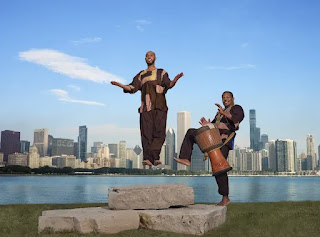VIA CHICAGO READER
Muntu Dance Theatre of Chicago. Courtesy Matt Karas
“We believe that there is merit in all cultures and that we should strive to celebrate our similarities instead of focusing on our differences,” says artistic director Regina Perry-Carr. “We’re an African American organization, but we strive to celebrate humanity.”
Muntu evolved out of a drum and dance group called Unifying Humanity Through Cultural Creativity (UHCC), whose leaders were motivated by a desire to uplift their identities and cultures as African Americans while honoring their connections to West African culture and arts. In 1974, the group officially changed its name to Muntu, a Bantu word that means “the essence of humanity.”
More than 50 years since its founding, it’s clear that Muntu has always been ahead of the curve. Perry-Carr says that under the leadership of president Joan Gray in the 1980s, the organization became the first West African dance company in the United States to pay its dancers salaries and benefits. Then in 1993, they launched the Arts for Community Empowerment (ACE) program to teach local children and teens from kindergarten through grade 12 about various aspects of the African diaspora through dance, art, and music. Through ACE, they set a bold example of how arts organizations could prioritize community engagement through youth education.
“When Muntu’s ACE program started, there really wasn’t any other system like that in the city,” Perry-Carr says. “Our founders were really forward-thinking people, and they knew innately that it was really about more than just performing. It was also about preserving [culture] through education.”
Perry-Carr herself is partially a product of Muntu Dance Theatre’s teachings. Her mother, Regina Taitts, was a dancer with the company in its early days, and the time Perry-Carr spent around the company in her childhood left a lasting impression. In 1994, Perry-Carr entered the company’s workshop training program, and by 1998, she had worked her way up the ranks to become a full-time teaching artist and dancer.
“Being able to see that kind of representation and see examples of professionalism, artistry, and people living their passion through dance [at Muntu] impacted me and developed my passion for the arts,” she says.
Perry-Carr left Muntu in 2003, but she returned in 2020 as the company’s fourth artistic director, working with executive director Sekou Conde, who also oversees the ACE program, which currently provides arts programming to six Chicago schools.
“I feel responsibility in that, a lot of times, we’re someone’s first introduction to understanding African culture,” she says.
Despite its long history and stature within the dance community, Muntu Dance Theatre has continuously battled negative public perceptions and stereotypes about West African dance, which is often not taken as seriously as other dance forms, such as ballet. Perry-Carr says Muntu aims to shift that narrative.
“When we come to spaces, there’s often still a lot of education that we have to do because of the many stereotypes that are placed on us,” she says. “West African dance in general historically has been looked at as uncivilized, and that goes way back to the transatlantic slave trade.”
In 2019, Muntu joined the Chicago Black Dance Legacy Project (CBDLP). The goal of the project is to reduce inequities that Black-led dance companies have had to navigate for decades by providing a select cohort of organizations with funding, operational support, and performance opportunities.
Muntu’s participation in CBDLP has allowed Perry-Carr to find support and connect with leaders at other companies, who often navigate similar obstacles.
“It’s been an awesome coming-together space,” Perry-Carr says. “The Chicago Black Dance Legacy Project has helped bring people together more frequently where we may not have crossed paths as often—so it’s created a space for us to build community and strength in numbers.”
In August, Muntu Dance Theatre will facilitate DanceAfrica Chicago, a three-day festival that brings together African and African American dancers and organizations from across the country for a weekend of dance, conversation, and community. Perry-Carr is optimistic that the festival will provide a much-needed space for participants to connect over their passion for the African diaspora and amplify the beauty of their art. In addition to the festival, Muntu Dance Theatre is developing a cultural exchange program with a dance company in Senegal, which will provide an opportunity for their dancers to hone their skills in West Africa.
With so many projects underway, it’s clear that Muntu Dance Theatre is on its way to becoming an artistic powerhouse on a truly global scale.
“We’re not only a voice for Muntu, but we’re a voice for all West African or African diaspora culture workers,” Perry-Carr says.
The Chicago Black Dance Legacy Project is a program of the Logan Center for the Arts at the University of Chicago. Their current cohort of local dance companies includes Chicago Multi-Cultural Dance Center & Hiplet Ballerinas, Deeply Rooted Dance Theater, the Era Footwork Collective, Forward Momentum Chicago, Joel Hall Dancers & Center, M.A.D.D. Rhythms, Move Me Soul, Muntu Dance Theatre of Chicago, NAJWA Dance Corps, and Praize Productions Inc. For more about CBDLP, visit chicagoblackdancelegacy.org, and chicagoreader.com/special/logan-center-for-the-arts-at-the-university-of-chicago

Comments